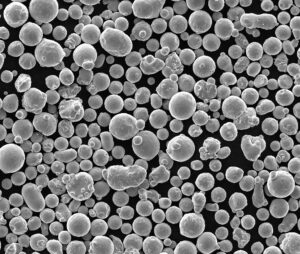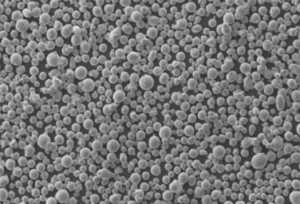Vue d'ensemble Poudre métallique de qualité
Les poudres métalliques sont des matériaux solides finement divisés qui jouent un rôle crucial dans diverses applications industrielles. De la fabrication additive (impression 3D) à la métallurgie des poudres, ces poudres sont les éléments constitutifs de la création de matériaux avancés aux propriétés spécifiques. Dans ce guide, nous allons plonger dans le monde des poudres métalliques de qualité, en explorant leur composition, leurs propriétés, leurs utilisations et bien plus encore.
Nous aborderons tous les sujets, des bases aux détails les plus avancés, pour vous aider à comprendre pourquoi la qualité est importante dans les poudres métalliques et comment choisir le bon type de poudre en fonction de vos besoins spécifiques.
Qu'est-ce qu'une poudre métallique de qualité ?
Le terme "poudre métallique de qualité" englobe diverses poudres à base de métal qui ont été raffinées, traitées et fabriquées pour répondre à des normes spécifiques dans le cadre d'applications industrielles et commerciales. Ces poudres se caractérisent par leur pureté, la taille de leurs particules et leur uniformité, ce qui garantit des performances constantes dans leurs applications finales.
L'importance de la qualité dans les poudres métalliques
Pourquoi la qualité est-elle si importante lorsqu'il s'agit de poudres métalliques ? Imaginez que vous essayiez de faire un gâteau avec de la farine de mauvaise qualité. Le résultat serait au mieux irrégulier, au pire immangeable. De même, l'utilisation de poudres métalliques de qualité médiocre dans les processus de fabrication peut entraîner des défauts, une baisse des performances, voire une défaillance catastrophique dans les applications critiques.
Des poudres métalliques de haute qualité garantissent que les produits finaux présentent la résistance, la durabilité et d'autres propriétés clés souhaitées. Elles contribuent également à l'efficacité des processus de fabrication en assurant l'uniformité et la cohérence, réduisant ainsi le besoin de retouches ou d'ajustements.
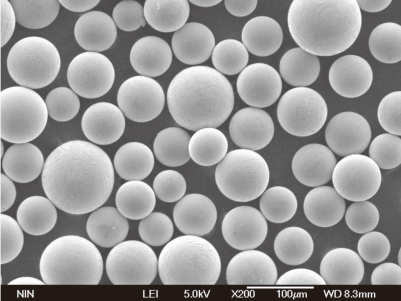
Types de poudres métalliques de qualité
Lorsqu'il s'agit de poudres métalliques de qualité, il n'existe pas de solution unique. Différentes applications nécessitent différents types de poudres métalliques, chacune ayant une composition, des propriétés et des avantages uniques. Examinons quelques-unes des poudres métalliques les plus couramment utilisées dans l’industrie.
| Poudre métallique | Composition | Propriétés | Applications |
|---|---|---|---|
| Poudre d'aluminium | Aluminium pur (Al) | Léger, résistant à la corrosion, excellente conductivité thermique | Aérospatiale, automobile, pyrotechnie |
| Poudre de cuivre | Cuivre pur (Cu) | Conductivité électrique élevée, excellente conductivité thermique | Composants électriques, systèmes de gestion thermique |
| poudre de fer | Fer pur (Fe) | Propriétés magnétiques, bonne résistance, bon rapport qualité-prix | Métallurgie des poudres, matériaux magnétiques, pièces automobiles |
| Poudre d'acier inoxydable | Fer, chrome, nickel | Résistance à la corrosion, haute résistance, durabilité | Dispositifs médicaux, composants aérospatiaux, pièces automobiles |
| Poudre de titane | Titane pur (Ti) | Rapport résistance/poids élevé, biocompatibilité, résistance à la corrosion | Aérospatiale, implants médicaux, composants automobiles |
| poudre de nickel | Nickel pur (Ni) | Résistance aux hautes températures, résistance à la corrosion, propriétés magnétiques | Superalliages, batteries, électronique |
| Poudre de cobalt-chrome | Cobalt (Co), Chrome (Cr) | Résistance élevée à l'usure, biocompatibilité, résistance à la corrosion | Implants médicaux, restaurations dentaires, composants aérospatiaux |
| poudre de tungstène | Tungstène pur (W) | Densité élevée, point de fusion élevé, excellente dureté | Outils de coupe, blindage contre les rayonnements, composants aérospatiaux |
| Poudre de magnésium | Magnésium pur (Mg) | Léger, bonne résistance, grande réactivité | Pyrotechnie, aérospatiale, automobile |
| Poudre de zinc | Zinc pur (Zn) | Bonne résistance à la corrosion, point de fusion bas, propriétés d'anode sacrificielle | Galvanisation, batteries, peintures et revêtements |
Poudre d'aluminium
La poudre d'aluminium est l'une des poudres métalliques les plus utilisées en raison de sa légèreté et de son excellente résistance à la corrosion. Elle est souvent utilisée dans les secteurs de l'aérospatiale et de l'automobile, où la réduction du poids est cruciale pour améliorer l'efficacité énergétique et les performances. En outre, la poudre d'aluminium est utilisée en pyrotechnie pour produire des étincelles blanches et brillantes.
Poudre de cuivre
La poudre de cuivre est appréciée pour sa haute conductivité électrique et thermique, ce qui la rend idéale pour les composants électriques et les systèmes de gestion thermique. Qu'il s'agisse de la production d'encres conductrices ou de matériaux de friction, la poudre de cuivre est essentielle pour de nombreuses applications de haute technologie.
poudre de fer
La poudre de fer, connue pour ses propriétés magnétiques et sa bonne résistance, est une option rentable pour diverses applications industrielles. Elle est largement utilisée dans la métallurgie des poudres pour créer des formes complexes qu'il serait difficile ou coûteux de produire avec des méthodes traditionnelles. En outre, la poudre de fer est utilisée dans l'industrie automobile pour fabriquer des pièces telles que des engrenages et des roulements.
Poudre d'acier inoxydable
La poudre d'acier inoxydable est un mélange de fer, de chrome et de nickel qui offre une excellente résistance à la corrosion et une grande solidité. Elle est donc idéale pour les appareils médicaux, les composants aérospatiaux et les pièces automobiles qui doivent résister à des environnements difficiles.
Poudre de titane
La poudre de titane est réputée pour son rapport résistance/poids élevé, ce qui en fait un matériau de choix pour les applications aérospatiales et médicales. Sa biocompatibilité le rend également adapté aux implants médicaux, tandis que sa résistance à la corrosion garantit sa longévité dans les environnements exigeants.
poudre de nickel
La poudre de nickel est appréciée pour sa résistance aux températures élevées et à la corrosion, ce qui en fait un composant clé des superalliages utilisés dans l'industrie aérospatiale. Il est également utilisé dans les batteries et l'électronique, où ses propriétés magnétiques sont avantageuses.
Poudre de cobalt-chrome
La poudre de cobalt-chrome combine la résistance à l'usure du cobalt et la résistance à la corrosion du chrome, ce qui la rend idéale pour les implants médicaux et les restaurations dentaires. Sa biocompatibilité garantit qu'il fonctionne bien à l'intérieur du corps humain, tandis que sa durabilité en fait un choix fiable pour les composants aérospatiaux.
poudre de tungstène
La poudre de tungstène est connue pour sa haute densité, son point de fusion élevé et son excellente dureté. Ces propriétés en font un matériau adapté aux outils de coupe, au blindage contre les radiations et aux composants aérospatiaux qui doivent résister à des conditions extrêmes.
Poudre de magnésium
La poudre de magnésium est le choix par excellence pour les applications où la réduction du poids est essentielle. Elle est à la fois légère et résistante, ce qui la rend idéale pour les industries aérospatiale et automobile. En outre, la poudre de magnésium est très réactive, ce qui en fait un ingrédient clé de la pyrotechnie.
Poudre de zinc
La poudre de zinc est largement utilisée pour sa résistance à la corrosion et ses propriétés d'anode sacrificielle, ce qui la rend essentielle dans les processus de galvanisation pour protéger l'acier de la rouille. Il est également utilisé dans les batteries, les peintures et les revêtements pour ses propriétés protectrices et conductrices.
Composition des Poudre métallique de qualité
La composition des poudres métalliques est un facteur essentiel qui détermine leurs propriétés et leur adéquation à différentes applications. Les poudres métalliques peuvent être des métaux purs, des alliages ou une combinaison de différents matériaux pour obtenir des caractéristiques spécifiques.
| Poudre métallique | Éléments primaires | Éléments supplémentaires |
|---|---|---|
| Poudre d'aluminium | Aluminium (Al) | Silicium (Si), Fer (Fe), Titane (Ti) |
| Poudre de cuivre | Cuivre (Cu) | Phosphore (P), Nickel (Ni), Zinc (Zn) |
| poudre de fer | Fer (Fe) | Carbone (C), Manganèse (Mn), Soufre (S) |
| Poudre d'acier inoxydable | Fer (Fe), Chrome (Cr), Nickel (Ni) | Molybdène (Mo), Carbone (C), Manganèse (Mn) |
| Poudre de titane | Titane (Ti) | Aluminium (Al), Vanadium (V) |
| poudre de nickel | Nickel (Ni) | Chrome (Cr), Fer (Fe), Molybdène (Mo) |
| Poudre de cobalt-chrome | Cobalt (Co), Chrome (Cr) | Molybdène (Mo), Tungstène (W), Nickel (Ni) |
| poudre de tungstène | Tungstène (W) | Carbone (C), Nickel (Ni), Fer (Fe) |
| Poudre de magnésium | Magnésium (Mg) | Aluminium (Al), Zinc (Zn), Manganèse (Mn) |
| Poudre de zinc | Zinc (Zn) | Aluminium (Al), Cuivre (Cu), Fer (Fe) |
La composition de chaque poudre métallique est soigneusement contrôlée pour répondre à des normes et à des critères de performance spécifiques. Par exemple, l'ajout d'éléments tels que le silicium et le fer dans la poudre d'aluminium peut améliorer sa résistance et sa dureté, tandis que la présence de chrome et de nickel dans la poudre d'acier inoxydable lui confère une résistance à la corrosion.
Propriétés d'une poudre métallique de qualité
Les propriétés des poudres métalliques sont déterminées par leur composition, la taille des particules et leur forme. Ces propriétés influencent le comportement des poudres au cours du traitement et leurs performances dans leurs applications finales.
Propriétés physiques
| Propriété | Poudre d'aluminium | Poudre de cuivre | poudre de fer | Poudre d'acier inoxydable | Poudre de titane |
|---|---|---|---|---|---|
| Densité (g/cm³) | 2.7 | 8.9 | 7.8 | 7.9 | 4.5 |
| Point de fusion (°C) | 660 | 1,085 | 1,538 | 1,400-1,530 | 1,668 |
| Conductivité thermique (W/m-K) | 237 | 401 | 80 | 15-30 | 22 |
| Conductivité électrique (S/m) | 37 x 10^6 | 58 x 10^6 | 10 x 10^6 | 1-10 x 10^6 | 2 x 10^6 |
| Taille des particules (µm) | 10-50 | 5-100 | 5-50 | 10-100 | 10-50 |
Propriétés mécaniques
| Propriété | Poudre d'aluminium | Poudre de cuivre | poudre de fer | Poudre d'acier inoxydable | Poudre de titane |
|---|---|---|---|---|---|
| Dureté (HV) | 45-100 | 60-140 | 60-90 | 150-250 | 250-350 |
| Résistance à la traction (MPa) | 70-150 | 200-350 | 150-250 | 600-1,200 | 800-1,200 |
| Élongation (%) | 3-12 | 20-45 | 2-10 | 25-50 | 15-25 |
Propriétés chimiques
| Propriété | Poudre d'aluminium | Poudre de cuivre | poudre de fer | Poudre d'acier inoxydable | Poudre de titane |
|---|---|---|---|---|---|
| Résistance à la corrosion | Haut | Modéré | Faible | Excellent | Haut |
| Résistance à l'oxydation | Modéré | Faible | Haut | Excellent | Excellent |

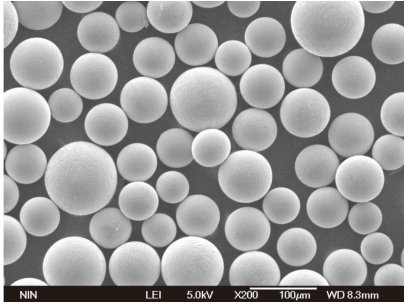
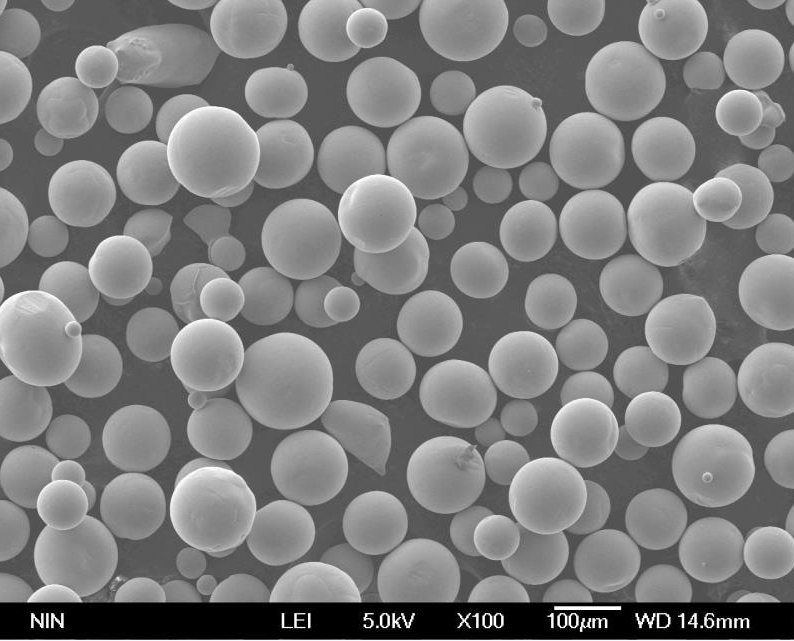
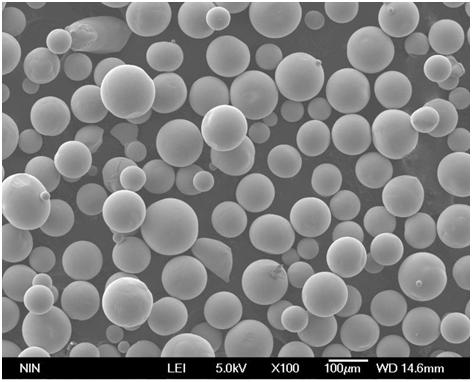

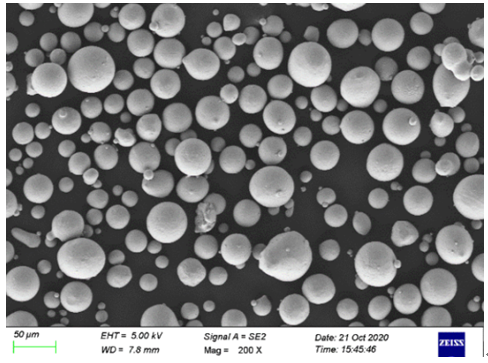
Applications des poudres métalliques de qualité
Les poudres métalliques sont utilisées dans un large éventail d'applications, chacune exploitant ses propriétés uniques. Voici quelques applications courantes et les poudres métalliques qui répondent le mieux à ces besoins :
| application | Poudre métallique | Détails |
|---|---|---|
| Fabrication additive (impression 3D) | Aluminium, Titane, Acier inoxydable | Ces poudres sont utilisées pour créer des géométries complexes et des pièces d'une grande résistance et d'une grande précision. |
| Métallurgie des poudres | Fer, acier inoxydable, cuivre | Utilisé pour produire des pièces de haute précision et des formes complexes dont la production est rentable. |
| Composants aérospatiaux | Titane, aluminium, cobalt-chrome | Critique pour les pièces qui nécessitent un rapport résistance/poids élevé et une résistance aux conditions extrêmes. |
| Pièces détachées automobiles | Fer, acier inoxydable, aluminium | Pour la fabrication de pièces durables et performantes telles que les composants de moteur et les engrenages de transmission. |
| Implants médicaux | Titane, Cobalt-Chrome | Matériaux biocompatibles utilisés pour les implants et les prothèses. |
| Composants électroniques | Cuivre, Nickel | Essentiel pour les composants à haute conductivité tels que les connecteurs et les cartes de circuits imprimés. |
| Systèmes de gestion thermique | Cuivre, aluminium | Utilisé dans les dissipateurs thermiques et les matériaux d'interface thermique pour gérer la dissipation de la chaleur. |
| Outils de coupe | Tungstène, Cobalt-Chrome | Reconnus pour leur dureté et leur résistance à l'usure, ils sont idéaux pour les outils de coupe et les forets. |
| Pyrotechnie | Magnésium, aluminium | Pour créer des fusées éclairantes et des feux d'artifice avec des couleurs vives et des effets intenses. |
| Galvanisation | Zinc | Protège les produits en acier et en fer contre la corrosion. |
Spécifications, tailles et qualités des poudres métalliques
Les spécifications, les tailles et les qualités des poudres métalliques peuvent avoir une incidence considérable sur leurs performances dans diverses applications. Voici un aperçu détaillé :
| Poudre métallique | Tailles disponibles | Notes | Spécifications |
|---|---|---|---|
| Poudre d'aluminium | 10-500 µm | Standard, fin, ultra-fin | ASTM B211, ISO 3250 |
| Poudre de cuivre | 5-200 µm | Standard, haute pureté | ASTM B244, ISO 2740 |
| poudre de fer | 5-100 µm | Standard, haute pureté | ASTM A595, ISO 3290 |
| Poudre d'acier inoxydable | 10-150 µm | 316L, 304L, 17-4PH | ASTM A313, ISO 5832 |
| Poudre de titane | 10-100 µm | CP Ti, Ti-6Al-4V | ASTM B348, ISO 5832 |
| poudre de nickel | 10-200 µm | Standard, haute pureté | ASTM B679, ISO 6207 |
| Poudre de cobalt-chrome | 10-150 µm | Co-Cr-Mo, Co-Cr-WC | ASTM F75, ISO 5832 |
| poudre de tungstène | 10-100 µm | Pure, alliée | ASTM B777, ISO 1176 |
| Poudre de magnésium | 10-200 µm | Standard, haute pureté | ASTM B93, ISO 1625 |
| Poudre de zinc | 10-150 µm | Standard, haute pureté | ASTM B6, ISO 1407 |
Fournisseurs et prix des poudres métalliques
Il est essentiel de trouver des fournisseurs fiables et de comprendre les prix pour s'approvisionner en poudres métalliques de qualité. En voici un aperçu :
| Fournisseur | Poudre métallique | Tarification (par kg) | Informations sur le contact |
|---|---|---|---|
| Alcoa | Poudre d'aluminium | $10 – $50 | www.alcoa.com |
| Umicore | Poudre de cuivre | $20 – $80 | www.umicore.com |
| Höganäs | poudre de fer | $15 – $60 | www.hoganas.com |
| BASF | Poudre d'acier inoxydable | $25 – $100 | www.basf.com |
| ATI | Poudre de titane | $100 – $300 | www.atimetals.com |
| SGL Carbon | poudre de nickel | $50 – $150 | www.sglcarbon.com |
| Élémentaire | Poudre de cobalt-chrome | $150 – $500 | www.elementum3d.com |
| Tungstène et poudres à l'échelle mondiale | poudre de tungstène | $200 – $600 | www.globaltungsten.com |
| Éléments américains | Poudre de magnésium | $30 – $120 | www.americanelements.com |
| Oxyde de zinc | Poudre de zinc | $20 – $70 | www.zincoxide.com |
Les prix peuvent varier en fonction de la pureté, de la taille des particules et du volume de la commande. Il est essentiel d'obtenir des devis directement auprès des fournisseurs afin de s'assurer que vous obtenez la meilleure offre pour vos besoins spécifiques.
Comparaison des poudres métalliques de qualité
Lorsqu'il s'agit de choisir entre différentes poudres métalliques, il est important de peser le pour et le contre de chaque option en fonction de leurs propriétés, de leurs applications et de leurs coûts.
| Poudre métallique | Avantages | Inconvénients |
|---|---|---|
| Poudre d'aluminium | Léger, excellente résistance à la corrosion, rentable | Résistance moindre par rapport à d'autres métaux |
| Poudre de cuivre | Conductivité électrique et thermique élevée, bonne usinabilité | Cher, peut se ternir avec le temps |
| poudre de fer | Economique, bonne résistance, propriétés magnétiques | Moins bonne résistance à la corrosion, peut être fragile |
| Poudre d'acier inoxydable | Résistance à la corrosion, haute résistance, durable | Plus cher, peut être difficile à traiter |
| Poudre de titane | Rapport résistance/poids élevé, résistance à la corrosion, biocompatibilité | Très coûteux, difficile à traiter |
| poudre de nickel | Résistance aux hautes températures, bonne résistance à la corrosion | Coûteux, il peut être difficile de travailler avec lui |
| Poudre de cobalt-chrome | Excellente résistance à l'usure et à la corrosion, biocompatible | Très cher, disponibilité limitée |
| poudre de tungstène | Extrêmement dur, point de fusion élevé, dense | Très cher, fragile |
| Poudre de magnésium | Légèreté, bonne résistance, réactivité | Très réactif, peut être difficile à gérer |
| Poudre de zinc | Bonne protection contre la corrosion, bon rapport coût-efficacité | Moins durable que d'autres métaux |
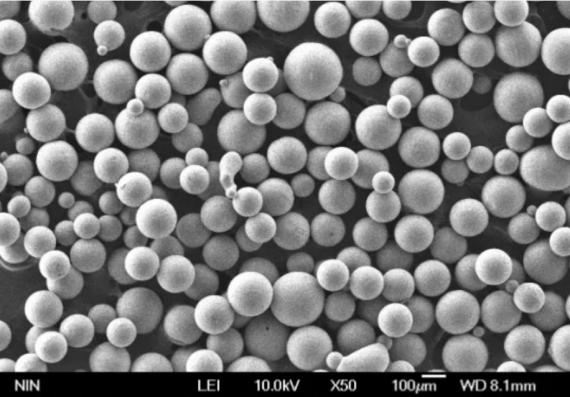
FAQ
Voici quelques questions et réponses courantes sur les poudres métalliques de qualité :
| Question | Réponse |
|---|---|
| Quelle est la poudre métallique la plus couramment utilisée ? | La poudre d'aluminium est largement utilisée en raison de sa légèreté et de son excellente résistance à la corrosion. |
| Comment choisir la poudre métallique adaptée à mon application ? | Tenez compte des propriétés requises pour votre application, telles que la solidité, la conductivité ou la résistance à la corrosion. |
| Les poudres métalliques posent-elles des problèmes environnementaux ? | Certaines poudres métalliques peuvent être dangereuses si elles ne sont pas manipulées correctement. Il convient de toujours respecter les consignes de sécurité et les réglementations. |
| Les poudres métalliques peuvent-elles être recyclées ? | Oui, de nombreuses poudres métalliques peuvent être recyclées, bien que le processus dépende du type de métal et des niveaux de contamination. |
| Quels sont les facteurs qui influencent le prix des poudres métalliques ? | Les facteurs comprennent la pureté, la taille des particules, la quantité commandée et la demande du marché. |
